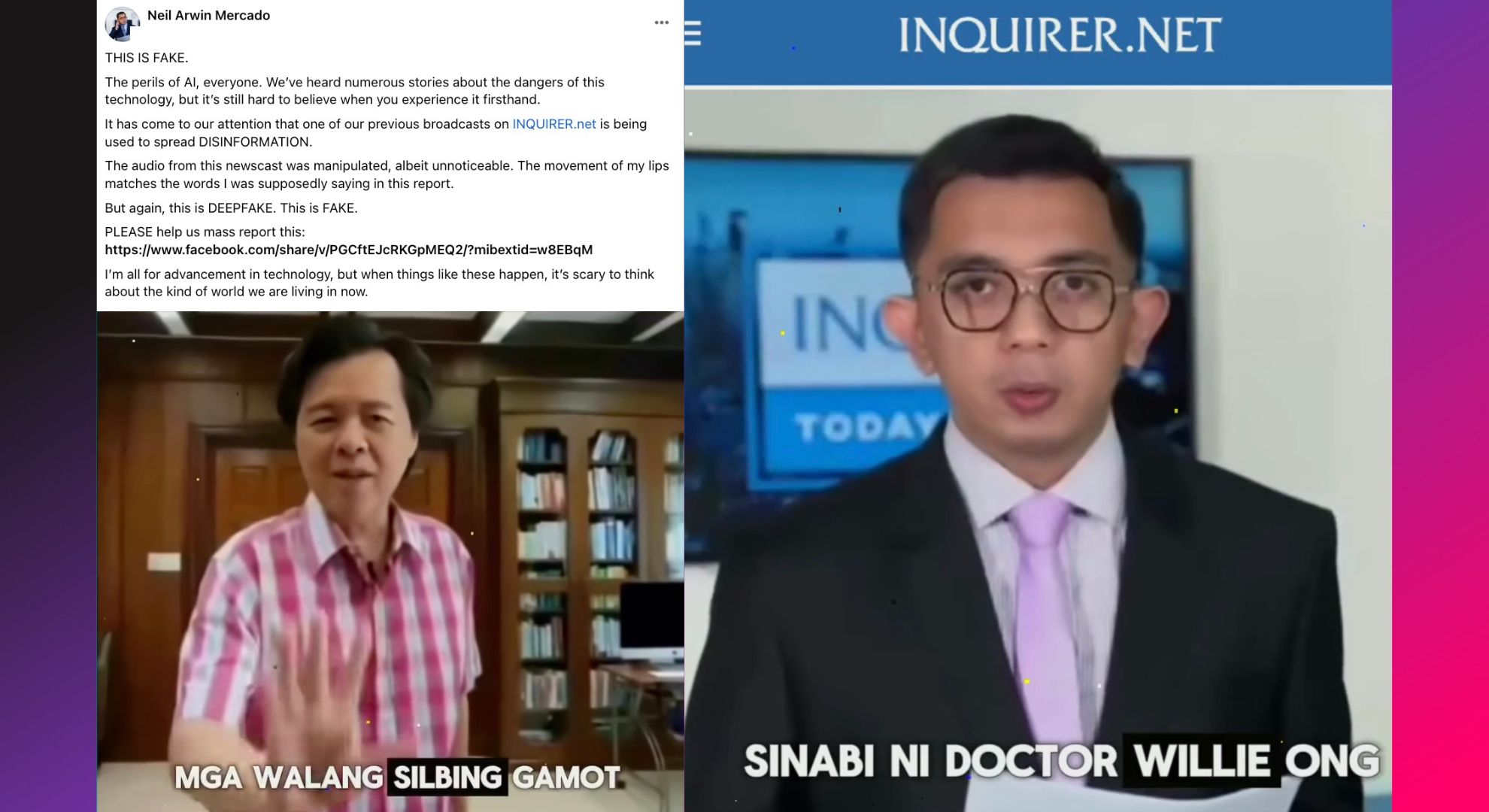The integration of artificial intelligence (AI) in various sectors has sparked both excitement and apprehension in recent years. One area that has seen profound impact is journalism. Today, we’re witnessing the rise of AI-generated content, such as deepfake videos or algorithmically generated news articles. However, as AI tools continue to advance exponentially, the future of journalism stands at a critical juncture, raising profound questions about authenticity, accountability, and the ethical implications of AI in media production.
Just recently, Neil Mercado, INQUIRER.net reporter and main anchor of its flagship news program INQToday, raised alarm about the misinformation that is being disseminated through manipulated audio and deepfake technology. An AI-generated video is making the rounds online, in which Neil Mercado is doing a lead-in to Doctor Willie Ong’s take on prostate health. While eagle-eyed viewers would be able to spot noticeable indications of fakery, there is significant potential for a lot of people to accept the video as a legitimate news item, subsequently igniting discussions about the dangers of AI-generated content. Mercado’s concern also underscores the looming threat posed by AI to the integrity of journalistic content and the credibility of media sources.
One of the primary concerns regarding AI-generated journalism is the erosion of trust and reliability. As AI tools become more sophisticated, they can fabricate convincingly realistic audiovisual content, making it challenging for audiences to discern between genuine and manipulated information. This phenomenon undermines the credibility of news organizations and contributes to the proliferation of misinformation and fake news, further polarizing public discourse and eroding democratic values.
Moreover, the rise of AI in journalism raises ethical dilemmas regarding content ownership, intellectual property rights, and the boundaries of journalistic integrity. The ease with which AI can replicate human voices and faces blurs the line between authentic reporting and synthetic fabrication, posing fundamental questions about journalistic standards, transparency, and accountability. Newsrooms must grapple with these ethical complexities as they navigate the evolving landscape of AI-driven media production.
Despite these challenges, the global media industry is actively exploring ways to leverage AI to enhance journalistic practices. Many news organizations are integrating AI-powered tools for data analysis, fact-checking, and content generation to improve accuracy, efficiency, and audience engagement. Additionally, AI-driven algorithms personalize news delivery, curate content based on user preferences, and enhance user experience.
However, the widespread adoption of AI in journalism also raises concerns about job displacement and the role of human journalists in an increasingly automated industry. While AI can streamline workflows and augment journalistic capabilities, more nuanced judgment, contextual understanding, and ethical decision-making inherent in human reporting are needed. The symbiotic relationship between AI and human journalists must be carefully balanced to preserve the integrity and authenticity of journalistic storytelling.
Looking ahead, the future of journalism in the age of advanced AI hinges on proactive measures to address the ethical, regulatory, and societal implications of AI-driven media production. News organizations must prioritize transparency, accountability, and responsible AI governance to safeguard journalistic integrity and rebuild public trust. Collaborative efforts between technologists, journalists, policymakers, and civil society are essential to developing ethical frameworks, standards, and guidelines for AI usage in journalism.
Furthermore, investments in media literacy, critical thinking skills, and digital literacy education are crucial to empower audiences to discern and evaluate information in an AI-mediated environment. By fostering a culture of media literacy and ethical journalism, societies can mitigate the risks of AI-driven misinformation while harnessing the transformative potential of AI to enhance journalistic practices, amplify diverse voices, and foster informed public discourse.
The convergence of AI and journalism presents both challenges and opportunities for the media industry. While the proliferation of AI-generated content threatens authenticity and trust, strategic integration of AI tools can enhance journalistic quality, efficiency, and audience engagement. By navigating the ethical complexities, promoting transparency, and fostering media literacy, the global media ecosystem can navigate the evolving landscape of AI-driven journalism while upholding the fundamental principles of truth, accuracy, and public service.
Other POP! stories that you might like:
Here are the AI ‘News Anchors’ rocking the scene at the moment
‘The perils of perpetual online presence’: Teacher lashes out at students during TikTok live
Filipino R&B artist Denise Julia under fire for ‘sexual objectification’
Filipino NCTzens divided over Lucas’ fan meeting announcement in the PH
These John Cena-Katy Perry photos expose troubling double standards women still face



